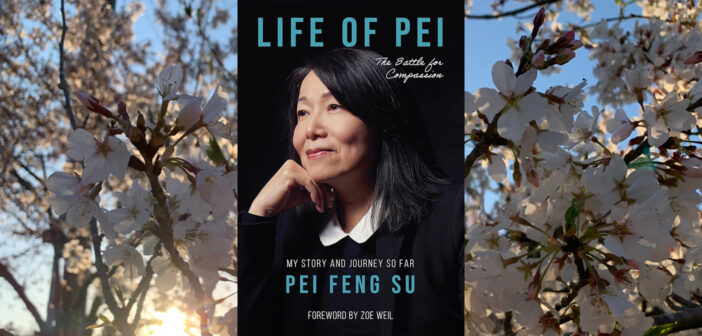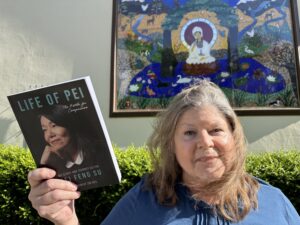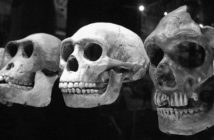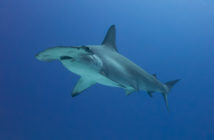It was at the Asia for Animals conference in Singapore in 2005 when I first met Pei Feng Su. She was standing at the rear of an exhibit room, behind an array of images of animals photographed undercover for an expose of Chinese fur farms. The pictures were horrifying and heartbreaking, but the cruelty was important to document, as China was then and is still the world’s largest fur market.
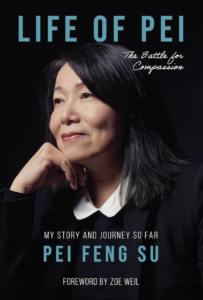 In contrast to the sickening images, the face of Pei Feng Su was calm and comforting. She gave off the vibe of a person who was easy to know, with warm eyes and an open visage. I had the feeling that I already knew her. But though we became instant friends, I knew little of her remarkable life story until reading her 2024 autobiography Life of Pei: The Battle for Compassion, My Story and Journey So Far.
In contrast to the sickening images, the face of Pei Feng Su was calm and comforting. She gave off the vibe of a person who was easy to know, with warm eyes and an open visage. I had the feeling that I already knew her. But though we became instant friends, I knew little of her remarkable life story until reading her 2024 autobiography Life of Pei: The Battle for Compassion, My Story and Journey So Far.
People come to animal advocacy along many paths. Perhaps most come from having relationships with animals that convince them of their sentience, and then learning of the ways in which animals are monstrously treated in this world, they begin to speak against it. The more they speak out, the more adamant they begin to feel about wrong treatment of animals and, in time, the more confident they become in their position against it. Discovering pro-animal philosophical resources help in articulating their feelings. Discovering religious teachings that call for humane treatment of animals gives a spiritual dimension to the “battle for hearts and minds” that is how many animal advocates see their efforts.
Pei’s journey to compassion for animals was different from the norm in that she had no childhood bond with animals, and seemingly no positive feelings for them whatsoever, until she encountered a group of animal-loving Buddhist monks in her native Taiwan when she was in her early twenties. It was through Buddhism that Pei learned of animal sentience, the idea that animal souls are equal in value to human souls, and that the first precept of Buddhism is to refrain from killing. One of the monks, Wu Hung, became her spiritual teacher and mentor in animal activism. However, it was many years longer before Pei had her first personal relationship with an animal – a stray cat she encountered and adopted when she was in her early forties.
In the years working with Wu Hung, Pei learned how to campaign in the nominally Buddhist culture of Taiwan, referring to Buddhist precepts of care for all sentient beings to inform the behavior of citizens and then government officials. Pei and her cohort learned to conduct undercover investigations – first into cruel dog pounds where animals were left to starve. Knowledge of the brutal manner of dog control led to an animal welfare law being passed in Taiwan. The campaigning brought Pei and Wu Hung into contact with international organizations. It was through collaboration with the World Society for the Protection of Animals that Pei met her second important mentor, Joy Leney, a WSPA specialist in dog management. Joy became very influential in Pei’s life trajectory.
Pei and Wu Hung developed plans to travel and visit animal organizations in the U.S. and Europe, and it was after those experiences that Joy assisted Pei in relocating to the United Kingdom, where she completed a master’s degree and eventually joined the staff of WSPA, working out of the London office as a China specialist. At that time, WSPA was an organization of member societies that existed throughout the world. It was a unique and valuable role, but one that WSPA eventually abandoned along with the board ouster of its director general and a name-change to World Animal Protection (WAP).
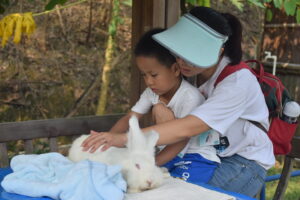
Child learning to gently handle a rabbit during an ACTAsia Caring for Life lesson. Image courtesy ACTAsia.
It was after a few years working for WSPA that Pei began to think of a new mission for herself. In 2006, along with a former colleague from WSPA, Pei formed a new organization: ACTAsia. It would be based in the U.K., where Pei had put down roots, but its purpose would be to “educate children, consumers, and professionals in Asian societies to promote kindness to and compassion for people, animals, and the environment.” The focus of ACTAsia has always been on China, where there is work enough for many organizations. Another one of the groups dedicated to change in China is Animals Asia Foundation, started by Jill Robinson, which aims to end cruel bear bile farming. For many decades there have been animal shelters in China (even in the Mao years), and now there are numerous groups of young Chinese activists working to rescue dogs and cats from the meat trade. There are also a few organizations focusing on wildlife and nature protection. So far, they are tolerated by the Chinese government.
It was about the time Pei founded ACTAsia – after she had become an internationally recognized animal worker and after she had become a mother – that Pei began to love an animal for the first time. This animal was the stray cat referred to above. For animal advocates who have grown up around animals, developing affectionate relationships with animals comes naturally, unless the feeling of kinship with animals that children are born with is conditioned out of them by parents and greater society. This pummeling of natural empathy leads to a psychological state called “cognitive dissonance.” Yet even if we succumb to cognitive dissonance about eating meat – and this is a state that afflicts most human beings who grew up eating meat and feeling bad about it – children may still be allowed to develop deep bonds of friendship and love with animals considered pets. This relationship would include developing a familiarity with the different minds of other-than-human animals. But for Pei, getting to know the cat she named Socks was a mysterious journey full of delights, surprises, and major heartbreak when Socks eventually passed away. Pei finally understood the sadness felt by a childhood friend when her dog died.
In the 18 years since the formation of ACTAsia, it has met with surprising success in the People’s Republic of China, what we think of as mainland China, for its program Caring for Life Education. Caring for Life recognizes people, animals, and the environment as interrelated and interdependent, and aims to teach this concept through the six years of primary and elementary schooling. Unfortunately, it has been difficult for ACTAsia to finish developing the curriculum due to funding insufficiency. This is typical for humane education: everyone agrees it is crucial, but few have the longterm vision to provide donations to this end. It is too longterm for most animal protection donors, who prefer the feel-good of having rescued an animal, say, to preventing the animal from ever having gotten into harm’s way in the first place. Still, Caring for Life Education has won awards and is recognized by the government of the PRC as well as the United Nations. This is no little feat, and it deserves financial support to complete the curriculum.
Life of Pei: The Battle for Compassion, My Story and Journey So Far is told in a conversational style that makes it seem as though Pei is telling you the story of her life over coffee in your living room. As if you are good friends, Pei shares the unembellished truth of her journey. She takes pride in her accomplishments, all of which involved hard work, but there was good fortune too in meeting people who wanted to help make her efforts possible. Pei experienced hardship in her youth, with a harsh father but a mother who was a good role model, who worked hard to provide for five children. Most fortunately, Pei has three devoted sisters who have helped her with money when she needed it along the way, and they have also helped her with various aspects of ACTAsia’s Caring for Life Education program.
In Pei’s Afterword to Life of Pei, you will learn of her latest battle, this time with cancer.
Pei reveals things about her life that make her feel ashamed or embarrassed – things that most people would leave out of their autobiographies. But Pei tells it as she remembers it, as her heart feels it. Like me, when I met her, you too may become Pei’s instant friend after reading Life of Pei.
Pei Feng Su and ACTAsia can be reached at https://www.actasia.org/
Life of Pei: The Battle for Compassion, My Story and Journey So Far is available on Amazon, for $18.60 new, but also used options.
Lantern Publishing & Media, PO Box 1350, Woodstock NY 12498 USA; <lanternpm.org>, Copyright 2024 Pei Feng Su

